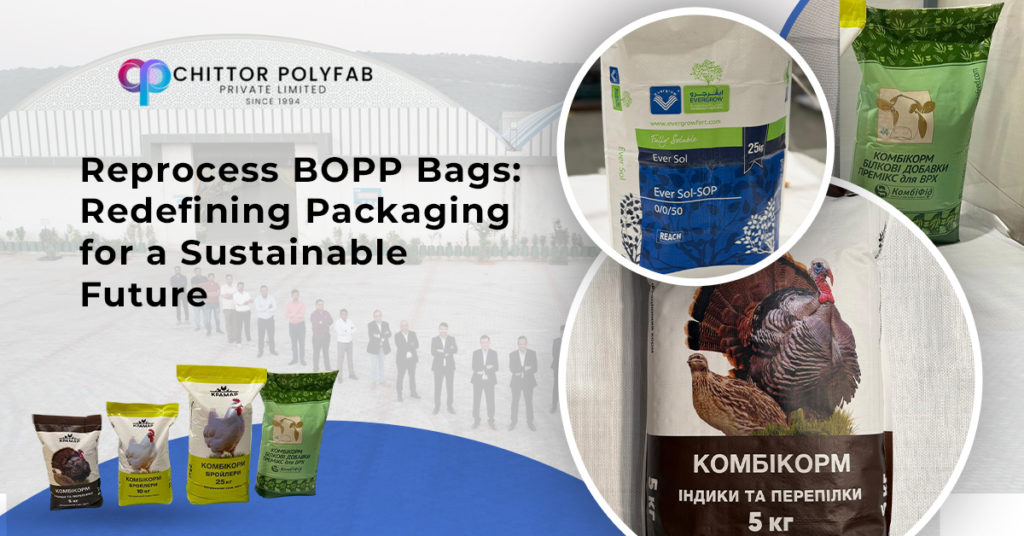Modern industries are shifting from disposable packaging to smarter, circular solutions. Among the most efficient materials leading this transition are reprocess BOPP bags, known for their balance of sustainability, durability, and versatility. These bags meet industrial demands while reducing environmental impact and aligning with the global move toward eco-responsible production.
What Are Reprocessed BOPP Bags
Reprocessed BOPP bags are produced by recycling post-industrial and post-consumer polypropylene film. The process involves collecting, cleaning, melting, and re-extruding the material into new, high-strength BOPP film. This innovation allows manufacturers to maintain performance standards similar to virgin-grade material while cutting down on waste and raw material consumption.
By turning used plastic film into valuable packaging again, industries keep materials in circulation and minimize landfill waste.
How Reprocess BOPP Bags Support Circular Economy
The idea behind reprocess BOPP bags aligns with the principles of a circular economy that focuses on keeping products and resources in continuous use.
- Collection and Segregation: Used BOPP films are gathered from industrial and consumer waste streams.
- Cleaning and Sorting: Impurities, inks, and residues are removed to ensure material purity.
- Regranulation: The cleaned plastic is melted and reformed into uniform polymer granules.
- Remanufacturing: Granules are extruded and stretched to produce strong reusable film.
- Conversion: This new film is transformed into durable packaging ready for industrial applications.
Each cycle reduces dependency on virgin plastics and supports sustainability commitments across sectors.
Environmental Benefits of Reprocess BOPP Bags
Adopting reprocess BOPP bags contributes to both environmental and economic performance. Manufacturers and brands benefit from measurable sustainability improvements such as:
- Reduced carbon footprint as recycling and reprocessing consume less energy than creating virgin polypropylene
- Conservation of resources with lower fossil fuel extraction and raw material usage
- Waste reduction by diverting large volumes of plastic from landfills
- Lower emission levels through cleaner production and minimal industrial discharge
These outcomes position reprocessed packaging as a key part of corporate sustainability programs and compliance frameworks.
Performance and Quality Remain Uncompromised
Despite being made from recycled material, reprocess BOPP bags retain essential mechanical and visual properties that make them suitable for modern packaging needs.
- High tensile strength for heavy loads
- Excellent moisture and chemical resistance
- Smooth surface for advanced printing and branding
- Resistance to tearing and puncture during transportation
The performance consistency of reprocessed film enables industries to achieve high-quality packaging results while maintaining environmental responsibility.
Versatile Applications Across Industries
The demand for reprocess BOPP bags spans across many sectors. Their adaptability makes them suitable for:
- Agriculture: Packaging for fertilizers, seeds, and animal feed that needs moisture protection
- FMCG and Food Products: Packaging for dry food items and snacks requiring hygienic and attractive presentation
- Textiles: Lightweight and flexible packaging for yarns, fabrics, and garments
- Chemical Industries: Secure packaging for powder and granular materials requiring barrier protection
These applications demonstrate that reprocessed materials can perform efficiently across multiple industries.
Technological Advancements in Reprocessing
With the advancement of recycling and extrusion technologies, the quality difference between reprocessed and virgin BOPP materials has been minimized. Modern filtration and decontamination systems ensure clean resin output, while co-extrusion technology allows a combination of reprocessed and virgin films for specific applications such as food-grade packaging.
Automation and precision in production also reduce energy use, improving cost efficiency and sustainability.
Compliance with Evolving Regulations
Environmental regulations and Extended Producer Responsibility (EPR) norms in India and global markets encourage the use of recycled materials in packaging. Integrating reprocess BOPP bags into production helps companies meet these regulations while enhancing their sustainability credentials.
Brands using recycled packaging are also viewed favorably by consumers who prefer responsible and eco-conscious businesses, helping to strengthen market reputation.
Economic Advantages of Using Reprocessed BOPP Bags
Reprocessing supports both environmental goals and business efficiency. Reprocessed BOPP resin costs less than virgin resin, resulting in significant savings for high-volume packaging producers. These savings are achieved without any compromise in print quality, durability, or performance.
For industries aiming to optimize costs while maintaining brand image, reprocessed BOPP packaging delivers a practical solution that benefits both production and sustainability targets.
